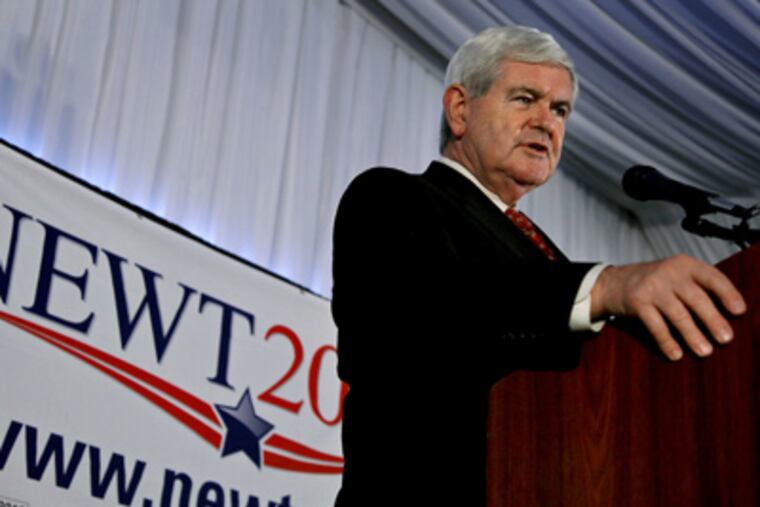Zeroing in on S. Carolina
Gingrich's strategy targets the heavily Christian conservative state.

NEWBERRY, S.C. - For three decades, the Republican who has won South Carolina's presidential primary has also won the GOP nomination.
That record helps explain why Newt Gingrich, a self-described lover of history, is working more aggressively than any of his competitors to organize activists and volunteers ahead of the Jan. 21 primary, essentially pinning his candidacy on a state filled with Christian conservatives.
His chief rival, Mitt Romney, is approaching South Carolina tentatively. He invested huge sums in the state in the 2008 presidential race, only to bail just days before the vote when it became clear he would lose big to Arizona Sen. John McCain. Many voters couldn't overlook their skepticism of Romney's Mormon faith and his reversals on some cultural issues.
The others in the 2012 race are treating South Carolina as an afterthought while they bank their candidacies on one of the two states that vote first, Iowa and New Hampshire.
Enter Gingrich, who's enjoying a burst of momentum after a summer campaign meltdown.
"I do believe South Carolina will be the decisive primary," the former House speaker from Georgia told Republicans who packed a theater in Newberry last week. "If we win here, I believe I will be the nominee."
But victory in the state won't come easy for the thrice-married Gingrich.
He has acknowledged having had an extramarital affair, an issue that may turn off Christian conservatives, who hold great sway in South Carolina. Gingrich, a recent convert to Catholicism, frequently makes a point of talking about his close partnership with third wife Callista.
He has advocated a "humane" approach to immigration that would let longtime residents work toward citizenship. Critics have labeled that as "amnesty" for millions of foreigners who are illegally in the United States, and that's another potent issue in the state.
Winning in South Carolina would be even more difficult if he were to come in with a 0-2 record, losing in both Iowa and New Hampshire.
Perhaps for all those reasons, if not in spite of them, Gingrich is building the largest presidential organization in the state. He's sinking more into South Carolina than he has in any other early voting state as he seeks to capitalize on his rebound after a troubled campaign start, when his staff quit.
He has opened five offices and hired nine people, the most of any of the Republicans.
South Carolina voters are starting to notice Gingrich, and at least some like what they see.
Virginia Coker of Hartsville attended a town-hall-style meeting last week at the Newberry Opera House that doubled as a fund-raiser for the state party. She was hardly a fan before Gingrich took the stage and answered more than a dozen questions from the party faithful. She left a convert.
"He's going to be the nominee," Coker predicted.
Romney, a former Massachusetts governor in his second presidential bid, is working quietly to build an organization in the state. He hasn't visited much and has only three paid workers in South Carolina. But Romney has done the groundwork for a campaign that could quickly be up and running if he chooses to compete in the state. Unlike Gingrich, Romney has millions in the bank to start airing television ads that could affect the race.
Texas Gov. Rick Perry and Rep. Ron Paul of Texas are the only candidates who have run TV ads in the state, though that was expected to change in the coming weeks.
GOP activists have yet to fall in line behind a single candidate, giving hope to those languishing at the back of the pack, such as Minnesota Rep. Michele Bachmann and former Pennsylvania Sen. Rick Santorum.
Bachmann has a lean operation and is keeping much of her focus on Iowa. She could tap into a network of evangelical Christians, if she performs well in Iowa first.
To some, Santorum appears to be the candidate most likely to engineer a surprise. "Crisis pregnancy centers are strongly behind Sen. Santorum," said Karen Floyd, a former South Carolina GOP chair, noting the powerful and wide network of antiabortion voters who show up on election day.
Still, the hurdles are high for those candidates.
Consider that conservative Christians who talk kindly of Santorum also finish their sentences with doubt about his ability to capture the nomination.
Said Harry Kibler an activist who runs RINO Hunt, a group that criticizes "Republicans in Name Only": "There's probably as much of a chance of the Rapture happening by election time as there is for Rick to win the nomination."